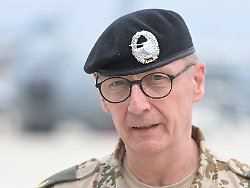Thursday, September 30, 2021
Change of command in elite troops
Brigadier General Meyer becomes the new KSK boss
After a series of scandals, the Bundeswehr’s elite troops are under increased surveillance. Because of missing ammunition or right-wing extremism in its own ranks, the KSK has recently mainly dealt with itself. At the end of the reform process, an Afghanistan veteran takes over the helm.
Brigadier General Ansgar Meyer is the new commander of the elite unit Command Special Forces (KSK) of the German Armed Forces. During a roll call in Calw, Baden-Württemberg, he took over command of the association of around 1,500 men and women from Brigadier General Markus Kreitmayr. This had initiated a reform process after extremist incidents, but was then criticized and the public prosecutor’s attention because of a collection campaign for hoarded ammunition. Kreitmayr had allowed soldiers to return illegally hoarded ammunition without further penalties.
The KSK is responsible for military tasks such as the liberation of deported Germans abroad and was most recently deployed in the Kabul airlift. Meyer was the commander of the last German contingent in Afghanistan and had controlled the withdrawal from the NATO mission. He is now taking over an association that is also under special observation of federal politics. The 2nd command company was dissolved after right-wing extremist incidents.
Högl certifies Meyer “a lot of experience”
The defense commissioner of the Bundestag, Eva Högl, called for the clarification of grievances to be continued. “The criminal and disciplinary processing of right-wing extremist activities still has to be resolved,” said Högl of the “Neue Osnabrücker Zeitung”. “It has to be made clear again and again that right-wing extremism has no place – neither in the special forces nor in the Bundeswehr,” said the SPD politician. Meyer brings a lot of experience to this task. “This is a good basis so that the KSK can concentrate on its core mission again.”
Defense Minister Annegret Kramp-Karrenbauer had prescribed a reform program for the KSK. More than 90 percent of the 60 individual measures had been implemented, the Ministry of Defense stated in a final report in June. However, the personal responsibility of former KSK commanders remained unnamed.
“Looking back, it must be stated that the causes of grievances and undesirable developments go far back into the past, the effects have accumulated over the years and have sometimes established themselves as an ominous bad culture,” says the paper. “This involuntarily raises the question of the responsibility of former superiors.”
